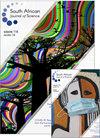非洲石膏世界:为南部非洲的石膏生态系统研究制定议程
IF 1.5
4区 综合性期刊
Q2 MULTIDISCIPLINARY SCIENCES
引用次数: 0
摘要
本文章由计算机程序翻译,如有差异,请以英文原文为准。
GYPWORLD Africa: Setting an agenda for gypsum ecosystem research in southern Africa
This paper introduces gypsum ecosystem research to southern Africa. It is the result of current joint efforts to compare African gypsum ecosystems with those in other parts of the world. We highlight the expansion of an international network through joint projects and training of young scientists. We propose a research agenda to sensitise the ecological community in Africa to the significance of life on gypsum and to demystify the existence of gypsum soil and associated ecosystems in southern Africa. Gypsum ecosystem research is rapidly moving up the international research agenda to better understand the dynamics and resilience of the life systems associated with atypical soils that are frequent in semi-arid to arid ecosystems. The southern African soil classification system does not sufficiently recognise the presence of gypsum as a differentiating criterion, hence not much is known about the region’s gypsum soil, and gypsum ecology has subsequently been largely neglected. This neglect is unfortunate, as the livelihoods of people are dependent on these gypsum ecosystems and these areas are worthy of protection due to the rare biotas that are adapted to survive in these harsh environments.
求助全文
通过发布文献求助,成功后即可免费获取论文全文。
去求助
来源期刊

South African Journal of Science
综合性期刊-综合性期刊
CiteScore
3.20
自引率
4.20%
发文量
131
审稿时长
1 months
期刊介绍:
The South African Journal of Science is a multidisciplinary journal published bimonthly by the Academy of Science of South Africa. Our mandate is to publish original research with an interdisciplinary or regional focus, which will interest readers from more than one discipline, and to provide a forum for discussion of news and developments in research and higher education. Authors are requested to write their papers and reports in a manner and style that is intelligible to specialists and non-specialists alike. Research contributions, which are peer reviewed, are of three kinds: Review Articles, Research Articles and Research Letters.
 求助内容:
求助内容: 应助结果提醒方式:
应助结果提醒方式:


